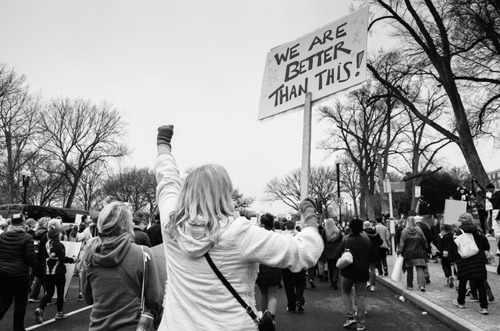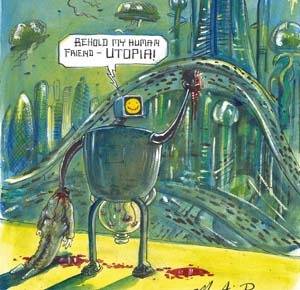
This article is a preview from the Summer 2017 edition of New Humanist. You can find out more and subscribe here.
“The biggest problem we have in our society and in the world right now,” Barack Obama suggested before he became US President, “is an empathy deficit.” It is a view that has become almost unquestioned, indeed almost unquestionable. “Behind every progressive policy,” the American academic George Lakoff suggests, “is a single moral value: empathy.” For the psychologist Simon Baron Cohen, at the root of evil lies “empathy erosion”.
Paul Bloom, a psychologist at Yale University, will have none of it. “When some people think of empathy,” he writes in his recent book Against Empathy: the Case for Rational Compassion, “they think of kindness. I think of war.” This might sound like one of those contrarian-for-effect arguments, an academic version of Ann Coulter or Milo Yiannopoulos baiting liberals. It is nothing of the sort. In Against Empathy, Bloom provides a thoughtful, considered, empirically grounded case which challenges many notions that we often accept as good without really thinking them through.
We live in an age in which, Bloom observes, reason is constantly deprecated and emotions celebrated. Social psychologists and neuroscientists insist that humans are irrational creatures. Many philosophers and sociologists claim that the appeal to reason is Eurocentric; Bloom writes of a sociology professor who “gently told me that my emphasis on reason expressed a particularly Western white male viewpoint.”
Meanwhile there are some 1,500 books on Amazon with “empathy” in their title, books for parents and teachers, self-help guides, marketing manuals, scientific tomes. “Without God,” Dostoevsky’s Ivan Karamazov suggested in The Brothers Karamazov, “everything is permitted.” For many today, Bloom observes, “without God” should be replaced by “without empathy”.
Bloom stands firmly against this tide. He makes his argument “because I believe our emotional nature has been oversold. We have gut feelings, but we also have the capacity to override them, to think through issues, including moral issues, and to come to conclusions that can surprise us.” Reason is what “makes us distinctively human, and it gives us the potential to be better to one another, to create a world with less suffering and more flourishing and happiness.” Empathy, on the other hand, is “a poor moral guide” in almost all realms of life, whether that be public policy, private charity or interpersonal relationships. In its place Bloom extols the virtues of what he calls “rational compassion”.
By “empathy”, Bloom means something highly specific. He is not talking about general sympathy for, or identification with, another’s plight. He refers rather to “the act of feeling what you believe other people feel – experiencing what they experience.”
So, what is the problem with such empathy? Bloom has a long checklist. First, empathy is like a spotlight that focuses on certain people, making us care more about them but leaving us insensitive to long-term consequences of our acts, and blind to the suffering of those we do not or cannot empathise with.
Think of Alan Kurdi, the Syrian toddler washed up on a beach near Bodrum in Turkey in 2015. Images of his body, lying prone, half in water, and later being carried away by a distraught policeman, generated shock and revulsion worldwide, and became the focus of intense debate about the heartlessness of the EU’s immigration policy.
Two years on, the bodies of men, women and children are still being washed up on Mediterranean beaches. Thousands more drown in the sea. Fortress Europe has been made even more of a fortress. Hostility to immigrants is no different today than it was in 2015.
The outpouring of empathy for Kurdi had, in other words, no long-term impact on EU migration policy. And while any support for migrants might seem welcome, empathy for certain high-profile, emotionally fraught cases has the danger of making others seem less deserving of our support. For every child migrant with whom we might empathise as a victim, there is an adult whom we scorn as unworthy of our support.
Empathy can work both ways. Those in favour of more liberal immigration might want you to empathise with those who suffer the lash of Europe’s harsh policies. Those hostile to immigration want you to empathise with the supposed victims of mass immigration – the native worker who cannot find a job, the victim of a terror attack, the woman who has been sexually assaulted. Whether immigrants are responsible for joblessness or higher crime rates is irrelevant. Empathy relies not on the facts but on emotional identification with the assumed victim.
This leads to Bloom’s second point against empathy. It is, he says, biased, pushing people “in the direction of parochialism and racism”. We cannot empathise with everyone in the world. So we have to pick and choose with whom we empathise. “Our empathic reactions,” as Bloom puts it, “reflect prior bias, preference, and judgement.”
Studies have shown that people express more empathy towards those they find amenable, or those seen as victims rather than as architects of their own misfortune. Some people have more empathy, for instance, for those who got AIDS by blood transfusion rather than through drug use. All this may seem obvious and banal. But, as Bloom observes, it also challenges what is taken as the obvious relationship between empathy and morality, and the oft-made claim that empathy is necessary for morality. “It can’t be that empathy simply makes us moral,” he writes. “Whether or not you feel empathy depends on prior decisions about who to worry about, who counts, who matters – and these are moral choices.”
Empathy is also innumerate. In making us care deeply for the suffering of one individual at the expense of our concern for thousands of others, it leads us, as both individuals and societies, to waste resources. We often fail to focus on areas or issues for which resources may be most needed or do most good.
Far from there being too little empathy in the world, there is too much. Most “cruel actions”, Bloom argues, are committed not “because the perpetrators are self-consciously and deliberately evil.” Rather, “it is because they think they are doing good,” because they think they are upholding moral norms, because they empathise with certain people or groups and, in so doing, are heartless towards others.
Against Empathy is a wonderfully argued, provocative polemic against the trend to see empathy as an unalloyed good. Bloom’s target is, however, more than simply empathy. It is rather the broader enthusiasm for emotionalism. For most people empathy does not necessarily mean feeling another’s pain literally. It means, rather, having an emotional attachment to another’s suffering. It is the rooting of moral claims in emotionalism that Bloom sets out to skewer.
Bloom notes early on in the book that he has a broader agenda. He wants “to make a case for the value of conscious deliberative reasoning in everyday life, arguing that we should strive to use our heads rather than our hearts.”
Bloom is dismissive of the arguments from scientific studies that reveal the irrationality of human decision-making and so question our ability to bring reason to bear upon our problems. Yes, he acknowledges, many studies do show the limitations to human reasoning. But “every demonstration of our irrationality is also a demonstration of our rationality,” because without our rationality “we wouldn’t be able to appreciate that it’s a demonstration of irrationality.” What many such studies show is that we are able to override our irrational biases, and think through our problems to a rational conclusion.
What does it mean to take a rational view? While Bloom’s case against emotionalism and for reason is vigorous and well-crafted, the argument for what he calls “rational compassion”, as a replacement for empathy, is less compelling.
Bloom adopts a broadly utilitarian approach, and is supportive of the “effective altruism” approach popularised in recent years by the Australian philosopher Peter Singer (see Toby Lichtig’s discussion of effective altruism in the Autumn 2016 New Humanist). Effective altruism, according to Singer, “is based on a very simple idea: we should do the most good we can.”
In a symposium in the Boston Review, Singer listed what effective altruists should do. This included “living modestly and donating a large part of their income [...] to the most effective charities”; “choosing a career in which they can earn most, not in order to be able to live affluently but so that they can do more good”; “talking to others, in person or online, about giving, so that the idea of effective altruism will spread”; “giving part of their body – blood, bone marrow, or even a kidney – to a stranger.”
It is a list that, at first glance, may seem so banal as to be unenlightening. But its very blandness raises deeper questions. For instance, if everyone in the world decided to choose “a career in which they can earn most”, might we not end up with a world in which there are too many bankers and too few teachers or doctors – or charity workers?
And what does it mean to “do the most good we can”? Every effective altruist, Singer replies, would give a different answer. But “all agree that a world with less suffering and more happiness in it is, other things being equal, better than one with more suffering and less happiness.” I cannot think of many “ineffective altruists” who would disagree with that. But, as with many utilitarian approaches, it is an answer that takes as given that which needs to be explained. After all, what is in debate is what it means to have “a world with less suffering and more happiness”.
Most of us would agree that charity is a good, and most of us give to charities. But many might also question whether charity should be, as effective altruists appear to argue, the key agent of social change. Many of the problems that effective altruists seek to alleviate, from disease to poverty, have their roots in particular political policies and social relations. In thinking merely of altruism, there is a danger of ignoring, even entrenching, such policies and relations.
Bloom and Singer are both aware of this. Drawing on the arguments of philosopher and psychiatrist (and effective altruist) Scott Alexander, Bloom makes a distinction between “man versus nature” and “man versus man” problems. It is the former upon which effective altruists focus their energy and resources.
The latter “has the potential for long-lasting change for the better, but the outcome is less certain.” Deciding to focus on altruism and to ignore the politics is, Bloom suggests, to adopt an “empirical” stance.
But is it? The question of alleviating poverty, for example, is not simply an empirical question of picking the most effective charity. It is also about the social relations and policies that underpin inequalities. Similarly, even “natural” disasters, such as famines or earthquakes, are made better or worse by the social conditions that surround them. Ignoring the context of the problem may, therefore, be a deeply ineffective way of tackling it. Or, to put it another way, it is good to be rational, but what is it to be “rational” when tackling social issues depends critically upon the context?
Bloom does not deny any of this, and Against Empathy may not be the book to explore such issues, even if they cannot be ignored if we want to discuss what it means to show “rational compassion”. What it is unquestionably, though, is an important and necessary challenge to the contemporary celebration of empathy and deprecation of reason.
“Against Empathy” is published by Bodley Head

